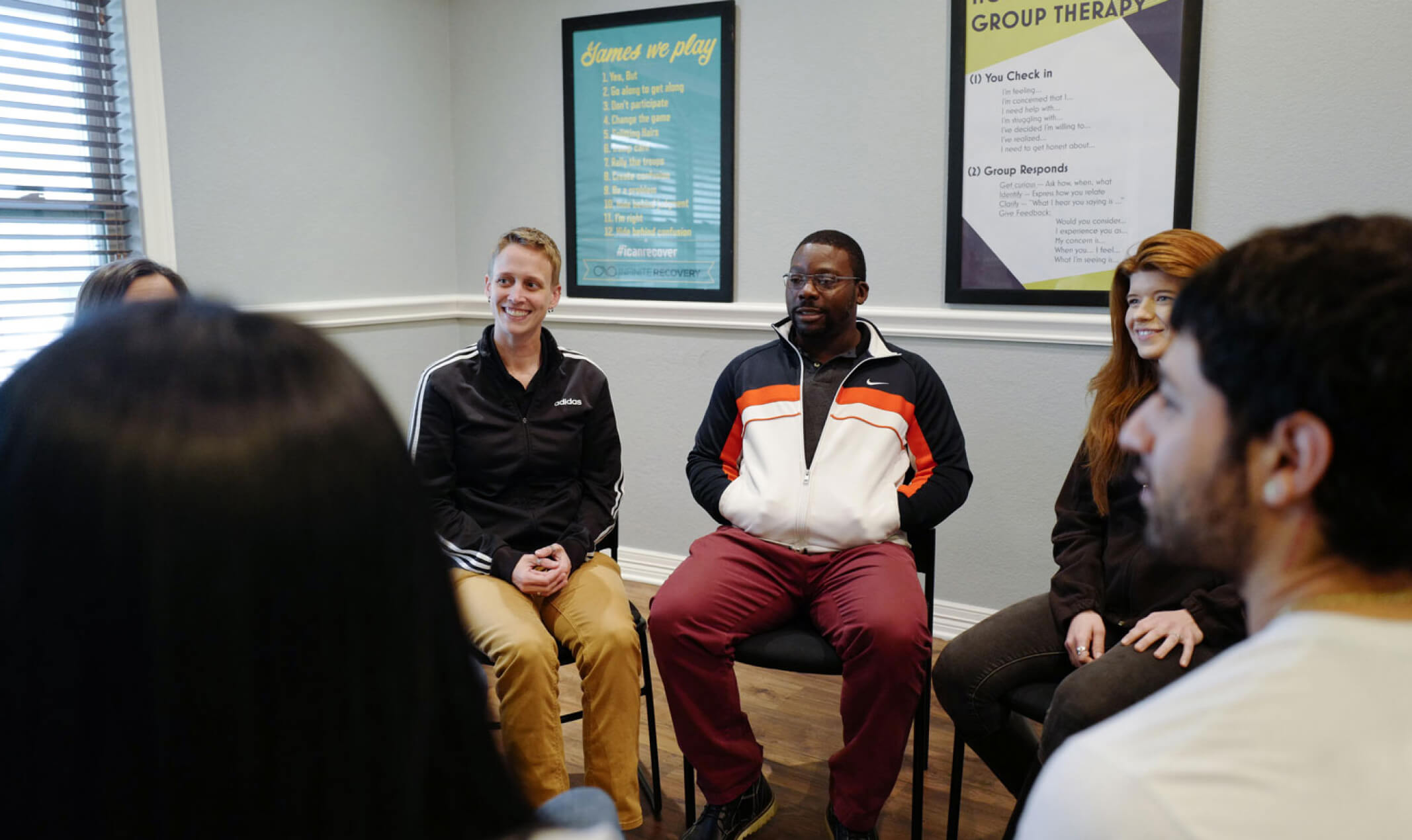Family Dynamics Therapy for Addiction and Mental Health
At Infinite Recovery, we understand how important a person’s family of origin can be when it comes to their substance use disorder and recovery process. That’s why we incorporate family dynamics therapy into our addiction programs. It’s all about helping you heal and grow with support from loved ones.
Family dynamics therapy sees the entire family system as a whole. What affects one person affects the entire family. Understanding addiction from this perspective offers a more holistic and compassionate perspective on their own one’s actions. It can also help heal relationships between them and their loved ones.

What is Family Dynamics Therapy?
Family dynamics therapy, also called family systems therapy, is a type of psychotherapy that was developed by psychiatrist Murray Bowen. It is based on the theory that the family is one emotional unit and is always interdependent to some degree. [1]
According to family systems theory, when one family member is unhealthy or distressed, it inevitably impacts everyone else within the family, who may then try to compensate through things like hyper-responsibility, emotional distancing, abusing substances, or lashing out.
Family relationships are the first relationships we have, and family members can have a significant impact on our mental and emotional health. Family systems theory is important for understanding addiction and recovery because it points to the underlying causes behind addictive behavior and also recognizes the impact that addiction can have on the entire family unit.

Family Systems Theory and Addiction
The eight concepts of Bowen family systems theory are:
- Triangles: This refers to the relationship dynamics between three family members who are impacting one another’s emotional or mental health.
- Differentiation of self: The process by which a person develops as an autonomous, independent person apart from their family unit.
- Nuclear family emotional process: The patterns that develop when a family experiences stress.
- Family projection process: The process by which individual family members, usually a parent, displace their emotions onto another family member, typically a child.
- Multigenerational transmission process: Different levels of differentiation between siblings can create marked differences between family lines over a period of time.
- Emotional cutoff: This refers to a member of the family severing the relationship, usually because of some longstanding conflict or difference of perspectives.
- Sibling position: There are marked patterns between individuals of a particular birth order.
- Societal emotional process: The patterns of interdependence observed in family systems can also be witnessed in society as a whole. [1]
More information about each of these concepts can be found through the Bowen Center for the Study of the Family.
The Impact of Family Dynamics on Addiction
The way families interact is crucial in how substance use problems start and continue.
Unhealthy patterns like enabling, codependency, and emotional withdrawal can make it difficult for someone to recover. These roles come up as family members try to deal with the effects of addiction, but they can actually make the addictive behavior worse and make it harder for the person to ask for help.
But, understanding family systems and addiction, as well as addressing these patterns and creating healthier family systems, can be a powerful tool for supporting recovery.
How Does ‘Family Dynamics Therapy’ Support Addiction Recovery?
The clinicians and therapists at Infinite Recovery utilize a variety of therapeutic techniques and modalities when working with clients one-on-one or within group settings. Family systems therapy is one approach that is particularly helpful when addressing addiction and the effects of addiction.
Addiction does not happen in a bubble. It can have many underlying causes, including past traumas, unhealthy relationships, and life stressors that take place within the context of the family.
The way a family raises and socializes a child affects their chances of developing substance abuse issues. Addiction also impacts loved ones, causing money problems, emotional stress, unfulfilled needs, and sometimes even violence.[2]
The complexity of the disease of addiction means that treating an individual without considering their family system has less chance of success. [2] By utilizing a family systems therapy approach, individuals can better understand why their addiction developed, how it impacts those around them, and how to make positive, sustainable changes for the future.
What to Expect During a Family Dynamics Therapy Session
A family systems therapist will utilize Bowen’s family systems theory along with other therapeutic frameworks. This will help an individual better understand themselves, process their emotions, and make progress toward their goals.
During the first few sessions, the therapist will ask questions about the client’s family of origin. This can include questions about the client’s relationship with their parents, birth order, childhood memories, family history of substance abuse, and more. The therapist may trace the family history back several generations and may incorporate the use of a family diagram to graphically represent the client’s immediate relations.
Throughout the treatment process, the therapist and the client will work together to uncover family patterns and dynamics. They may also practice skills like setting boundaries, communicating compassionately, and stepping outside of their family role to create a healthier version of self.
Our Family Services
Infinite Recovery recognizes that it is difficult to treat addiction without addressing the environment that enables or propels the addictive behavior. We actively engage the family members and loved ones of our clients and invite them into the treatment process.
When appropriate, we provide weekly updates to the family members of our clients and also invite them to our weekly online support group. Every month, we also host a 2-day family workshop, which provides education about the disease of addiction and facilitates interactions between clients and their loved ones, so that the entire family system can work on healing itself.
Other Therapies We Offer
In addition to family systems therapy, we also offer many traditional and alternative therapies for clients in our inpatient and outpatient treatment programs. We understand that people heal differently, so we provide a holistic range of options to meet clients at any stage of their recovery.
Our therapies include:
- ART Therapy (Accelerated Resolution Therapy)
- Boxing and Body Movement Therapy
- Cognitive Behavioral Therapy
- Family Therapy
- Family Dynamics Therapy
- Group Therapy
- Individual Therapy
- Motivational Interviewing
- Relapse Prevention Therapy
- Spirituality Therapy

Find Healing for Yourself and Your Family
Remember, healing takes time and effort. By working together, families can break the cycle of addiction and build a supportive environment that helps everyone in their recovery journey.
Infinite Recovery is a family-centered program designed to help you and your loved one heal and grow closer by understanding the disease of addiction as a chronic illness. Our holistic, trauma-informed treatments are designed to help clients identify and resolve the root causes of their addiction, instead of only treating symptoms.
We offer a full continuum of care, including detox, inpatient treatment, outpatient treatment, and alumni services, which are all covered in-network by most major insurance providers.
To learn more about our programs and how they can help you and your family find hope and healing from the effects of substance abuse, reach out today. We would be happy to speak with you confidentially and answer any questions you may have.